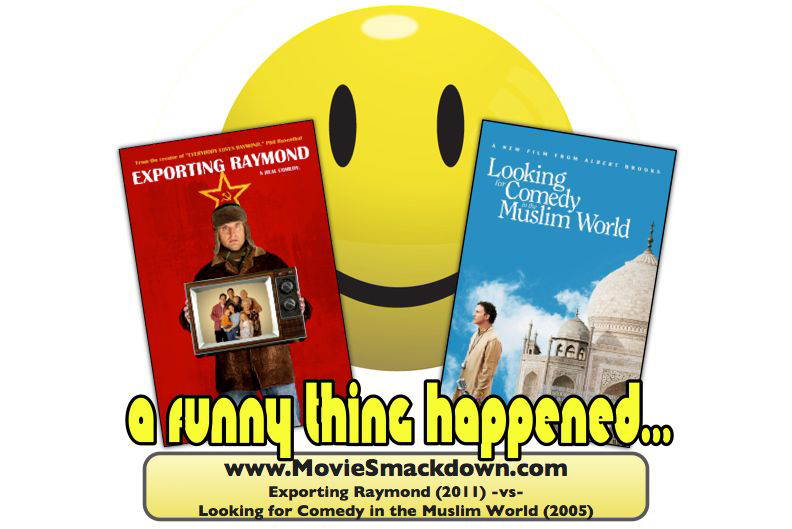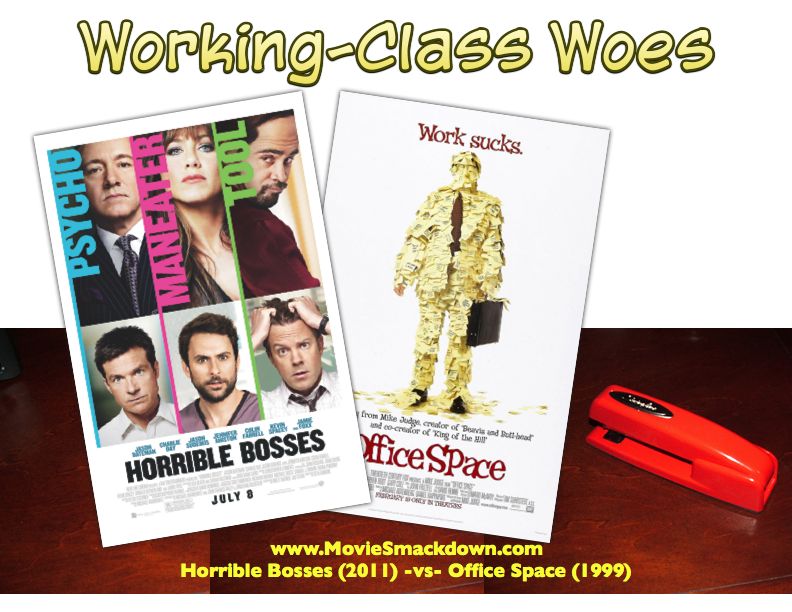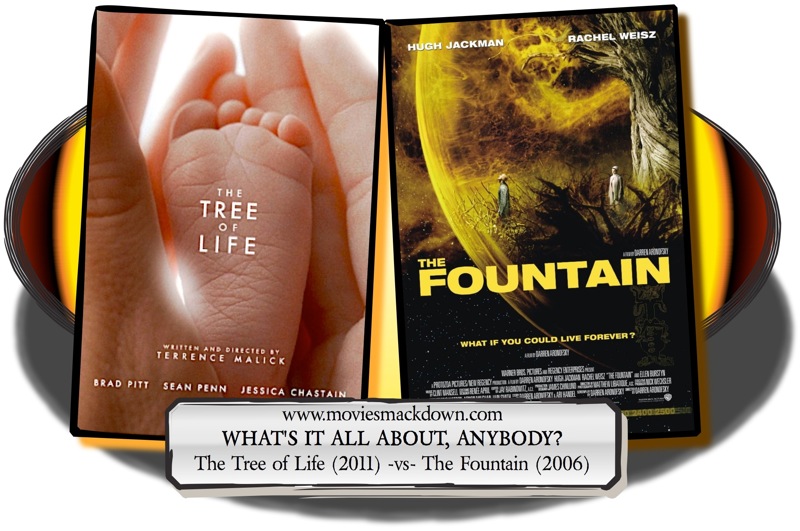
 The Smackdown
The Smackdown
Two very funny men – the co-creator/show-runner of one of the best sitcoms of the last two decades, and the writer/director/star of some of the best movie comedies of the previous two decades – are sent to seemingly unfunny countries on the other side of the globe, both in hopes that their humor is universal enough to withstand translation and jump cultural boundaries, and both in for a series of surprises, disappointments, and comic adventures.
Phil Rosenthal’s documentary Exporting Raymond, a wise-ass chronicle of his consulting gig on the Russian version of his iconic, long-running show “Everybody Loves Raymond,†is now out on video (as of Aug. 2) after a brief theatrical run. Is it the exercise in whiny narcissism it probably sounds like? And more to the point, does it cover the same sort of gefilte-fish-out-of-water territory that Albert Brooks covered in his (fictional) Looking for Comedy in the Muslim World (2005)? Is this deja vu all over again?
Grab a bowl of borscht and a dish of saag paneer, and sit back and enjoy an international Smackdown about the wonderful universality of comedy. Or lack thereof.
[singlepic id=1152 w=320 h=240 float=right]
The Challenger
In Exporting Raymond, Phil Rosenthal – think a 40-something Woody Allen minus the horn-rims and the horn-dog rep – uneasily accepts the task of going to Russia to consult on their version of his hugely successful sitcom. What he quickly finds is how difficult it can be for comedy, particularly this type of comedy, to cross certain cultural barriers. ELR was a comedy about an ordinary guy living an ordinary life, its appeal largely stemming from its being such an authentic, credible portrayal of marriage and family relationships among relatable, everyday people.
This doesn’t cut much ice with the Russians. The director insists that Russians want to see a strong, confident leading man, not a Ray Romano-like schnook. The costumer (a truly frightening ice-queen of a character) wants the wife in glamorous outfits, even while she’s doing the housework. The slapstick gags are outsized and awkwardly played. The studio audience is disallowed from laughing (and aren’t motivated to, anyway). The overworked writers simply don’t get some of the one-liners and seem determined to not even try. The network’s top comedy exec has no interest in comedy. Every time Rosenthal attempts to explain or make his case, he simply alienates the crew even more.
Will they ever figure out how to make this thing work, or is Everybody Loves Kostya doomed from the start? And how does Phil’s enigmatic driver tie in to all this?
[singlepic id=1146 w=320 h=240 float=right]
The Defending Champion
Looking for Comedy in the Muslim World is not a documentary, but writer/director/star Albert Brooks clearly wants to blur the line between fiction and reality, literally playing himself, making repeated self-deprecating references to his real-life career, and playing off the likes of actress-turned-director Penny Marshall and lawyer-turned-Senator-turned-actor Fred Dalton Thompson, also playing themselves.
The movie’s thin plot kicks in when Thompson recruits Brooks (between roles, clearly not proud of his hapless In-Laws remake) to participate in a government study by spending a few weeks in India and Pakistan in hopes of learning what makes Muslims laugh, and thus, understanding them better in the broader sense. Brooks, despite the daunting notion of writing a 500 page report on his findings, accepts the assignment, mainly in hopes of receiving a Medal of Freedom for his efforts. And that’s how he soon finds himself in India, asking strangers what makes them laugh, performing his esoteric stand-up act for a baffled crowd, and unwittingly disrupting the romantic life of his sweet, inexplicably supportive assistant Maya (Sheetal Sheth). And… well, that’s pretty much it, really.
The Scorecard
The general critical reaction to Exporting Raymond was oddly lukewarm, and I was quite surprised to find my own review of it being among the most positive. I suspect one’s response to it is directly related to how much a fan one is, and thus how protective one is, of Everybody Loves Raymond; knowing how well that show worked and what made it work is what really gives this thing its depth. One might find Rosenthal to be a bit of a kvetch, but to know the show is to know how absolutely right he is in his arguments, and his reactions to the obstinacy and at times baffling practices of the Russian TV industry (not to be condescending, but I mean, the studio audience is not allowed to make a sound. What’s with that?) makes for highly amusing frustration.
Admittedly, in the whole scope of things, the stakes are not particularly high; it’s hardly a tragedy if Everybody Loves Kostya never quite gels. But it is delightful, good-natured fun to see them try, to see the acerbic but ever-likable Rosenthal face off against this increasingly dire series of comedy-allergic obstacles.
On the other hand, the stakes in Looking for Comedy in the Muslim World make those in Exporting Raymond look like the fate of the universe. Which is to say: There aren’t any. “Albert†is recruited to do a 500Â-page report on comedy in India and Pakistan. Seriously, that’s the whole plot. What happens if he doesn’t get enough material for 500 pages? Better question: Why should we care? I’ll concede that good laughs can compensate for a lot; bring the funny, we’ll let the stakes things slide. Which brings us to the really sad part:
It’s not funny.
Like, at all. Like, it barely even attempts to be funny. Scene after scene is a demonstration of sheer, unabashed laziness. You know what Albert does in his attempt to find out what makes Muslims laugh? He walks up to strangers on the street and asks them, “What makes you laugh?†(This is a big chunk of the movie. I am not making this up.) And the responses? Some are baffled by the question. Some don’t speak English. One says Larry from the Three Stooges. Aaaand scene!
In the movie’s centerpiece, Albert performs his stand-up act for a packed audience of Muslims who gape in pained silence at some truly terrible material, and we gape right along with them. Is that the idea? Is the act not supposed to be funny? Is the humor of the scene more about the Muslims’ reaction to the act than the act itself? Either way, we’re left watching a desperately unfunny stand-up act for a good ten minutes… and we are then treated to a repeat of several chunks of the act when Albert later does the same set for a gang of Pakistanis, who, for reasons never explained, find it hilarious. So was the act supposed to be good after all, and the Indians simply didn’t get it, or is the idea that the Pakistanis will just laugh at anything, or that you just never know who’s gonna laugh at what? I really have no idea.
The Decision
It gives me no joy to report how utterly unfunny an Albert Brooks movie is, but here we are. The good news is that six years later, it’s clear that he hasn’t completely lost his touch; his Twitter feed @AlbertBrooks is a steady source of amusing quips, his Huffington Post columns are spot on, his novel sounds like a hoot, and as an actor, with the right material, he remains a joy to watch (I couldn’t possibly be more excited about the upcoming Drive). But he looks tired and bored here, as if it took the actual shooting of his script for him to realize how lazy it was. His last three writing/directing efforts showed a steady decline in quality, but with this one, he really bottomed out. In short, Looking for Comedy in the Muslim World finds exactly none. And neither will you.
Whereas, Exporting Raymond is the movie Looking for Comedy. so desperately tried to be. It’s an inconsequential but hugely enjoyable and winning ride, and as an added bonus, it’s real. So what have we learned today?
Sometimes a fish out of water results in big laughs and a fresh look at a foreign culture. Other times, you just get a dead fish.
Winner by TKO: Exporting Raymond.




I was working in the offices next to the company that distributed ‘Muslim World.’ Everyone knew it was awful from the inception. But when the cut came back they realized it was beyond awful. It was so unfunny that it was simply unwatchable. Even people who like Albert Brooks had to cringe at its sheer monumental crappiness. No wonder Brooks decided to write a book after this. He probably thought his film career was over. And, based on this film, it probably should be.
Wow. Did you miss this one. The more painful Looking For Comedy got the more funny it got. The show where he bombed and did that fake improvisational bit was one of the best comic moments in any movie. What about the sitcom they wanted him for for Al Jezerra? Never saw that in any movie.
Total disagreement on this one. Brooks wrote his movie to achieve his goal of bombing in the Muslim world. How much guttier can you get?
>>The show where he bombed and did that fake improvisational bit was one of the best comic moments in any movie.
It’s possible that it’s a matter of taste, and it just didn’t work for me. Or it’s possible that you need to see more movies. Actually, they’re not mutually exclusive.
>>What about the sitcom they wanted him for for Al Jezerra? Never saw that in any movie.
Never saw…a bad show being pitched? You need to see more movies. A bad show being pitched by al-Jazeera to Albert Brooks? You got me there.
>>Brooks wrote his movie to achieve his goal of bombing in the Muslim world.
That was his goal? Odd goal. Are you sure? To what end? Does he hate the Muslim world that much?
>>How much guttier can you get?
Dunno. But you can definitely get much funnier.
LOL. Well said.